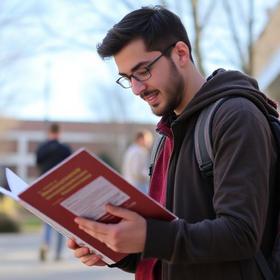- Cowley County Community College and Area Vocational-Technical School is committed to learning excellence and personal enrichment in an open access environment.
School Highlights
Cowley County Community College serves 3,245 students (42% of students are full-time).
The college's student-teacher ratio of 14:1 is lower than the state community college average of 16:1.
Minority enrollment is 34% of the student body (majority Hispanic), which is less than the state average of 40%.
Quick Facts (2025-26)
- Enrollment: 3,245 students
- In-state tuition: $3,204
- Out-state tuition: $5,256
- Student-teacher ratio: 14:1
- Minority enrollment: 34%
- Source: Integrated Postsecondary Education Data System (IPEDS)
School Overview
The teacher population of 231 teachers has stayed relatively flat over five years.
Cowley County Community College
(KS) Community College Avg.
Carnegie Classification
Associate's Colleges: Mixed Transfer/Career & Technical-High Nontraditional
Associate's Colleges: Mixed Transfer/Career & Technical-High Nontraditional
Institution Level
At least 2 but less than 4 years
At least 2 but less than 4 years
Institution Control
Public
Public
Total Faculty
231 staff
155 staff
Student Body
The student population of Cowley County Community College has grown by 31% over five years.
The student-teacher ratio of 14:1 has increased from 11:1 over five years.
The Cowley County Community College diversity score of 0.54 is less than the state average of 0.60. The school's diversity has grown by 10% over five years.
Total Enrollment
3,245 students
2,057 students
Student-Teacher Ratio
14:1
16:1
# Full-Time Students
1,374 students
606 students
# Part-Time Students
1,871 students
1,451 students
# Enrollment Undergraduate
324 students
229 students
# Full-Time Undergraduate Students
1,374 students
569 students
# Full-Time Graduate Students
n/a
11 students
# Part-Time Undergraduate Students
1,871 students
1,424 students
# Part-Time Graduate Students
n/a
5 students
Total Dormitory Capacity
500 students
342 students
% American Indian/Alaskan
2%
1%
% Asian
2%
3%
% Hispanic
11%
15%
% Black
5%
8%
% White
66%
60%
% Hawaiian
n/a
1%
% Two or more races
6%
4%
% Non Resident races
5%
2%
% Unknown races
1%
6%
Diversity Score
0.54
0.60
College Completion Rate (Students who graduate in less than 4 years)
47%
41%
College Completion Rate (Students who graduate in 4 years or more than 4 years)
n/a
31%
Average Graduate Earnings (10 Years)
$35,600
$34,000
Tuition and Acceptance Rate
The public in-state tuition of $3,204 is less than the state average of $3,402. The in-state tuition has declined by 14% over four years.
The public out-state tuition of $5,256 is more than the state average of $4,296. The out-state tuition has stayed relatively flat over four years.
In-State Tuition Fees
$3,204
$3,402
Out-State Tuition Fees
$5,256
$4,296
Tuition Notes
Tuition and fees bas
% Students Receiving Some Financial Aid
93%
90%
Median Debt for Graduates
$8,000
$8,892
Median Debt for Dropouts
$4,750
$5,467
Acceptance Rate
n/a
100%
ACT Composite
n/a
21
Sports
Total Sports Offered
10 sports
Sports
BaseballBasketball
CheeringCross Country
DanceSoccer
SoftballTennis
Track and FieldVolleyball
Source: 2024 (or latest year available) Integrated Postsecondary Education Data System (IPEDS) , School Administrators
School Notes
- School Mascot: Tank The Tiger
- Cowley is both a community college with transfer programs and a vocational/technical school offering two-year job-ready degree programs, students with very diverse needs will find us a perfect educational fit. The College works hard to maintain standards of quality that will provide students with an education that will prepare them to transfer to a four year program or enter the workforce. Cowley is a cutting edge institution, respected throughout the country as a leader in innovation and quality. We strongly encourage both parents and prospective students to explore their educational opportunities with us. Cowley has over 70 majors and programs of study. Degrees offered include the Associate of Arts, Associate of Science, Associate of Applied Science, Associate of General Studies, and the College Certificate. Cowley College is among the fastest growing community colleges in the nation. We take pride in the quality of our education, small classes and student activities. Our main campus is located in Arkansas City, a small community of around 13,000 people in south-central Kansas. We have several outreach centers across the region including two enrollment locations located in Wichita and a center in Mulvane. If you are unable to attend our physical locations you are able to earn an accredited degree fully online! Cowley County Community College and Area Vocational-Technical School is fully accredited by the North Central Association of Colleges and Schools, and by the Kansas State Board of Regents.
Frequently Asked Questions
How much does Cowley County Community College cost?
Cowley County Community College's tuition is approximately $3,204 for In-State students and $5,256 for Out-State students.
What sports does Cowley County Community College offer?
Cowley County Community College offers 10 interscholastic sports: Baseball, Basketball, Cheering, Cross Country, Dance, Soccer, Softball, Tennis, Track and Field and Volleyball.
Recent Articles

How to Transfer from Community College to a Four-Year University in 2025
A step-by-step guide for community college students transferring to a four-year university in 2025 — updated strategies, data and expert insights.

Scholarships for Community College Students 2025
Explore updated scholarship programs, tuition data, and expert strategies for community college students in 2025.

The Rise of Technical and Vocational Training in 2025
Explore the 2025 surge in technical and vocational training—enrollment, policy, costs, and why this path is gaining ground for students and parents.









